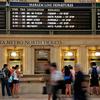Jim O'Grady appears in the following:
First Fare Hikes, Now NJ Transit Users Will Pay More to Park
Monday, December 06, 2010
Over there, an empty spot. Image by Flickr user JGNY
(New York -- Jim O'Grady, WNYC) New Jersey Transit is preparing to charge more money for parking spots. The cash-strapped agency says its plan to privatize eighty-one parking lots at train stations and bus stops will raise an estimated $100 million dollars.
The agency has narrowed the field of competing companies to seven. The winning firm will be chosen in May and offered a 30 to 50 year lease. It will then control 60% of the parking spots in New Jersey Transit's system.
Prices are expected to rise at lots that already charge drivers to park and fourteen free lots covered by the plan are likely to begin collecting fees. The increases come on top of a 25% fare hike in May for New Jersey Transit train and interstate bus commuters.
Critics say the agency is sacrificing steady income for a large up-front payment. Jay Corbalis, an analyst with the public policy group New Jersey Future, said the plan is mainly designed to deliver a spike of revenue toward next year's budget.
"But that compromises future revenue for the agency," he said.
He added that privatization will lock up some parcels next to train and bus stops that might better be developed with office buildings and stores. "It raises a number of questions about the long-term use of the lots," he said. "This land would not be available for 30 to 50 years for transit-oriented development."
NJ Transit says a private operator will upgrade the lots and bring consistency to a system that is operated by a combination of municipal, private and New Jersey Transit operators.
First Fare Hikes, Now NJ Transit Riders Will Pay More for Parking
Monday, December 06, 2010

New Jersey Transit is preparing to charge more money for parking spots. The cash-strapped agency says its plan to privatize eighty-one parking lots at train stations and bus stops will raise an estimated $100 million dollars.
Christie Hires Law Firm to Fight Feds Over ARC Reimbursement
Thursday, December 02, 2010

MTA "Terror-Proofing" Bridges and Tunnels
Wednesday, December 01, 2010
Manhattan Bridge, New York City. Image: (CC) by Flickr user barry.pousman
(New York — Jim O’Grady, WNYC) The MTA is coming to the end of a $250 million project to “terror-proof” seven bridges spanning the East River and ten subway tunnels passing under it, reports The New York Post. The hardening includes lining tunnels with high-impact metal, dropping massive slabs of rock and concrete on the riverbed where tunnels have not been dug through bedrock, and fitting bridges with blast-resistant plates and collars on cables.
MTA spokesman Kevin Ortiz confirmed that the hardening was not a routine upgrade but “related to increasing security in the system.” He said the budget came from “a combination” of sources, including the MTA, the Department of Homeland Security and federal stimulus money.
The U.S. Department of Homeland Security is urging municipalities across the country to adopt New York City's security saying: "If you see something, say something."
Asked about other security projects in New York City, he said the agency continues to add surveillance cameras and police patrols at river crossings. The slow roll out of cameras are a sore point with the agency. In 2005, MTA hired Lockheed Martin to install 1,750 advanced technology cameras throughout the subway that could detect unattended bags on platforms. The technology didn't work. Now MTA and Lockheed are arguing in court over the $251 million price tag.
Ortiz also said the Department of Homeland Security has officially adopted New York City’s “If you see something, say something” campaign. The department is urging municipalities around the U.S. to use the saying in their outreach to the public.
Rebuilt Roosevelt Island Tram Aloft
Tuesday, November 30, 2010
Riders looking noirish aboard the new Roosevelt Island Tram
(New York -- Jim O’Grady, WNYC) Hundreds of Roosevelt Island residents showed up this morning to do what they hadn’t been able to do for the past nine months: ride a tram above New York's East River into Manhattan. The tram had been shut down for three months longer than planned to undergo a $25 million renovation. All but the base of its three towers were replaced and sleek red gondolas with wraparound windows were put into service.
The tram now runs on parallel sets of cables that are powered separately, allowing its two gondolas to run independently of each other. Previously, the gondolas used a system that functioned as if they were on a clothesline so when one malfunctioned, the second stopped moving, too. And when one gondola was at the Manhattan station, the other had to be at Roosevelt Island, a mostly residential island in between Manhattan and Queens, NY.
Under the new system, both gondolas can be sent from one side or the other to handle rush hour. And a gondola can now be taken out of service at night if demand is light. Crucially, the tram can keep running with one gondola if the other needs to be grounded for maintenance.
The gondolas can now carry almost 200 people—up from 125—and travel on cables that are wider than before. That’s to help stabilize them as they glide 230 feet above the often windy East River.
Roosevelt Island resident Cynthia Baird showed up to check out the new tram but not to ride it. She said she and several of her neighbors had decided to wait before boarding the tram, though it’s much quicker than taking the subway's F train or Q102 bus. When asked why, she said: “In case it falls. I don’t want to be in it!”
Baird figures she’ll wait a day or two to let the kinks be worked out before returning to the tram and, along with many of the island’s 14,000 residents, her regularly scheduled commute.
NYC's Roosevelt Island Tram, After Repairs, To Be Airborne Again
Tuesday, November 30, 2010
Image: Roosevelt Island Operating Commission
(New York - Jim O'Grady, WNYC) The Roosevelt Island Tram will take to the skies above the East River this morning after shutting down for nine months of repairs. The $25 million overhaul was supposed to take six months. But the Roosevelt Island Operating Cooperation says delays were caused by city and state reviews and stretches of bad weather. In the meantime, the tram's approximately 2 million riders per year have been getting back and forth to Queens and Manhattan by bus, bridge and F train, each of which takes a lot longer than a four-minute ride by gondola.
All but the base of the tram's three towers have been replaced. Refurbished red cars have bigger windows for better views and waiting rooms and stations have been renovated and repainted. The cars will also travel along a wider cable designed to allow for faster service and less turbulence in high winds.
Safety has been an issue with the tram. A power outage in 2006 left 69 people trapped inside a gondola, dangling 200 feet above the river for several hours. Eight months before that incident, 80 riders were trapped on the tram for 90 minutes after a power outage.
The tram began service in 1976, about a year after the island itself opened to residents. A subway to Queens that served Roosevelt Island opened in 1989 but by then the tram had proved itself not only useful but iconic, so it remained in operation.
Transit Schedules Beefed Up for Holiday Rush
Wednesday, November 24, 2010

You may now flee to your ancestral homes. MTA and NJ Transit are adding extra trains and buses over the Thanksgiving holiday to handle the busiest three travel days of the year.
Engine Blowout, Not Birds, Forced Flight Back to JFK
Monday, November 22, 2010

FAA investigators say Engine 1 on a Delta flight to Moscow failed on Sunday, forcing pilots to fly back to Kennedy Airport using Engine 2. The Boeing 767 escaped serious damage, and avoided a possible crash, when turbine blades from inside the damaged engine shot into the air but missed the fuselage of the plane. It's unknown if the first engine caught fire at any point.
Bloomberg Pushes Subway to New Jersey
Wednesday, November 17, 2010

ARC is dead. Long live ARC in a different guise.
Tuesday's announcement that the city is seriously exploring sending the No. 7 subway line to New Jersey rippled through press conferences and urban planning groups. At a press conference to announce a comic book to help job seekers, Mayor Michael Bloomberg said the crush of riders between New York and New Jersey continues to rise, and that reality demands more cross-Hudson transit capacity.







